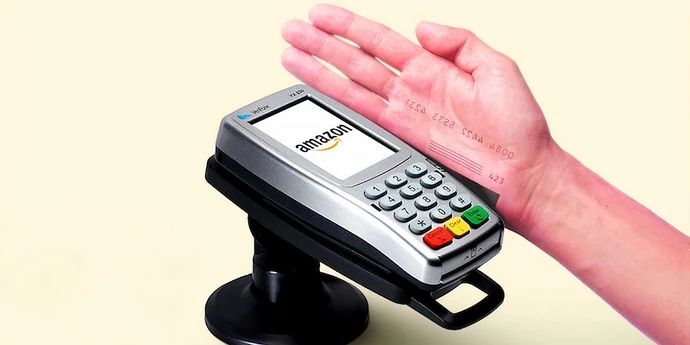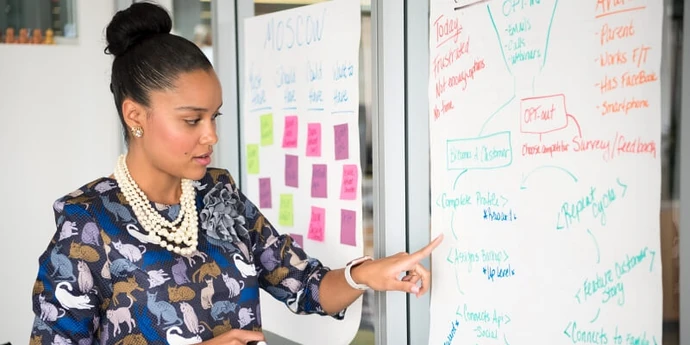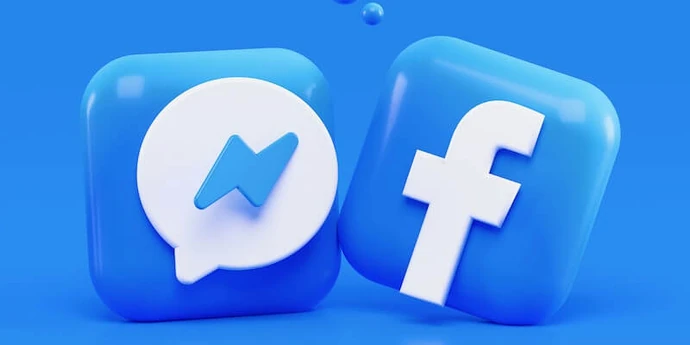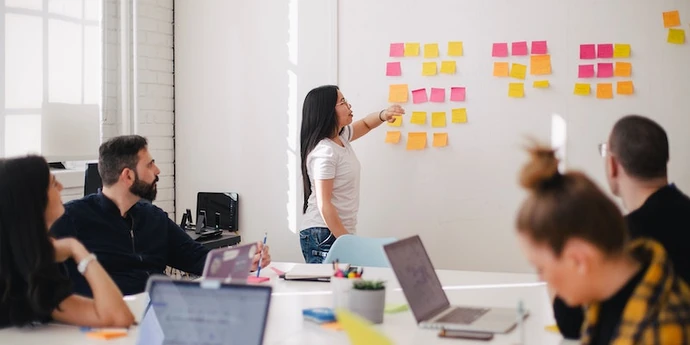Technical Program Manager interviews at Meta are really challenging. The questions are difficult, specific to Meta, and cover a wide range of topics.
The good news is that the right preparation can make a big difference to help you land the job. We have put together the ultimate guide to help you maximize your chances of success.
Here's an overview of what we will cover:
Click here to practice mock interviews 1-on-1 with Meta TPM ex-interviewers
1. Interview process and timeline
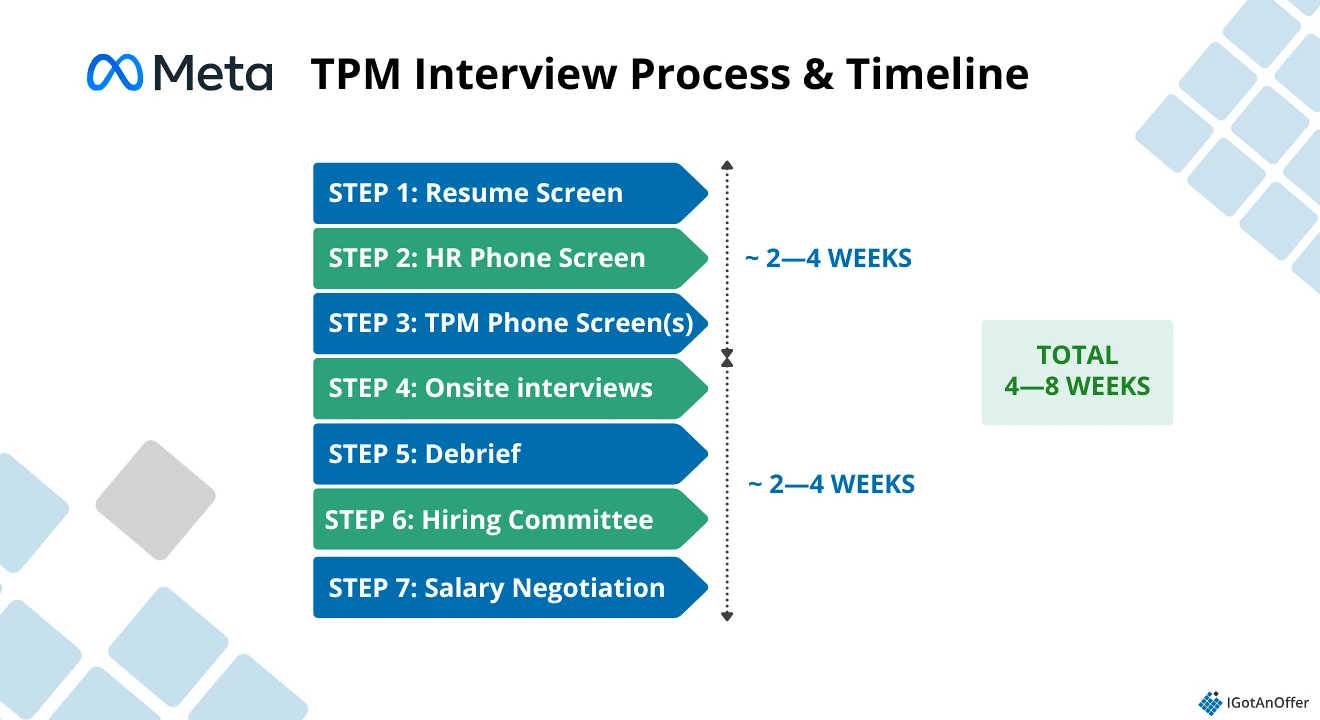
1.1 What interviews to expect
What's the Meta technical program manager interview process and timeline? It takes four to eight weeks on average and follows these steps:
- Resume screen
- Recruiter phone screen: one interview
- TPM phone screen: one or two interviews
- TPM onsite: typically five interviews
Let's look at each of these steps in more detail below:
1.1.1 Resume screen
First, recruiters will look at your resume and assess if your experience matches the open position. This is the most competitive step in the process, as millions of candidates do not make it past this stage.
You can use this free TPM resume guide to help tailor your resume to the position you’re targeting. You can also take a look at real Meta resume examples.
And if you’re looking for expert feedback, you can also get input from our team of ex-Facebook/Meta recruiters, who will cover what achievements to focus on (or ignore), how to fine tune your bullet points, and more.
1.1.2 Recruiter phone screen
In most cases, you'll start your interview process with Meta by talking to an HR recruiter on the phone. They are looking to confirm that you've got a chance of getting the job at all, so be prepared to explain your background and why you’re a good fit at Meta. You should expect typical behavioral and resume questions like, "Tell me about yourself", "Why Meta?", or "Tell me about your current day-to-day as a technical program manager."
If you get past this first HR screen, the recruiter will then help schedule your first TPM screen. One great thing about Meta is that they are very transparent about their recruiting process. Your HR contact will therefore walk you through the remaining steps in the hiring process, and will also share with you a helpful Meta TPM interview guide PDF.
1.1.3 TPM phone screen
You'll go through one or two initial 45mins screens which usually happen over the phone with a current Meta TPM. The types of questions you'll be asked are the same as during the onsite. Be prepared to cover: technical projects, architecture and system design, program sense, partnerships and leadership / team collaboration. More on this below.
The role of the phone screen is to make sure it's worth bringing you onsite. Your interviewer will therefore try to make sure there isn't an area where you are particularly weak and don't stand a chance to meet the hiring bar.
1.1.4 TPM onsite interviews
Onsite interviews are the real test. You'll typically spend a full day interviewing with Meta technical program managers, software engineers and product managers. Each interview will last about 45 minutes and cover one of the following topics:
- Technical project retrospective, where you'll be asked to deep dive into the technical aspects of past programs you've managed.
- Architecture and system design, where you'll have to design a large scale system from scratch to test your architecture skills.
- Program sense, where you'll be tested on your program management and execution acumen.
- Partnership, where you'll need to demonstrate your ability to work efficiently with cross-functional teams (e.g. engineering, product, etc.)
- Leadership / Collaboration, where you'll need to show you've successfully led teams in the past (e.g. motivate, resolve conflict, etc.)
[PRE-COVID] In addition to these interviews, you'll also have lunch with a fellow TPM while you are onsite. The lunch interview is meant to be your time to ask questions about what it's like to work at Meta. The company won't be evaluating you during this time, but we recommend that you behave as if they were.
In some cases, Meta may ask you to do a follow up interview after your onsite to drill further in one of the five areas listed above. This means you're close to getting an offer but the company wants to double-check you're meeting the hiring bar for a given criteria (e.g. program sense).
1.2 What happens behind the scenes
Your recruiter is leading the process and taking you from one stage to the next. Here's what happens behind the scenes at each of the stages described above:
- After the TPM phone screen, the interviewers you've talked to have 24h to submit their ratings and notes to the internal system. Your recruiter then reviews the feedback, and decides to move you to the onsite interview or not depending on how well you've done.
- After the Onsite, the five interviewers will make a recommendation on hiring you or not and the recruiter compiles your "packet" (interview feedback, resume, referrals, etc.) If they think you can get the job, they will present your case at the next candidate review meeting.
- Candidate review meetings are used to assess all candidates who have recently finished their interview loops and are close to getting an offer. Your packet will be analyzed and possible concerns will be discussed. Your interviewers are invited to join your candidate review meeting, but will usually only attend if there's a strong disagreement in the grades you received (e.g. 2 no hires, 3 hires). If after discussions the team still can't agree whether you should get an offer or not, you might be asked to do a follow up interview to settle the debate. At the end of the candidate review meeting, a hire / no hire recommendation is made for consideration by the hiring committee.
- The hiring committee includes senior leaders from across Meta. This step is usually a formality and the committee follows the recommendation of the candidate review meeting. The main focus is on fine-tuning the exact level and therefore compensation you will be offered.
It's also important to note that hiring managers and people who refer you have little influence on the overall process. They can help you get an interview at the beginning but that's about it.
1.3 How TPM is organized at Meta
Finally, it's helpful to know how technical program management is organized at Meta. At the time of writing, there are two different TPM organizations within the company. The Infrastructure TPM org, and the Product TPM org.
The Infrastructure TPM org is a centralized organization that was started by ex-Microsoft program managers. It rolls into the Head of Infrastructure and delivers large-scale infrastructure programs. TPMs in that group tend to have a specific area of focus such as network engineering, data centers, capacity, etc. This is the first TPM org that was created at Meta and it usually hires candidates with a deep technical background.
The Product TPM org focuses on user-facing products (e.g. Newsfeed, Messenger, etc.) and rolls into the Head of Product Management for FB Apps. This group was created because a lot of PMs at Meta don't have a technical background. Yet, some user-facing product features do require strong technical chops (e.g. using machine learning to detect harrassment on FB). Product TPMs are therefore the bridge between engineering and product in these cases. Their role is similar to product manager technical role at Amazon.
2. Example questions
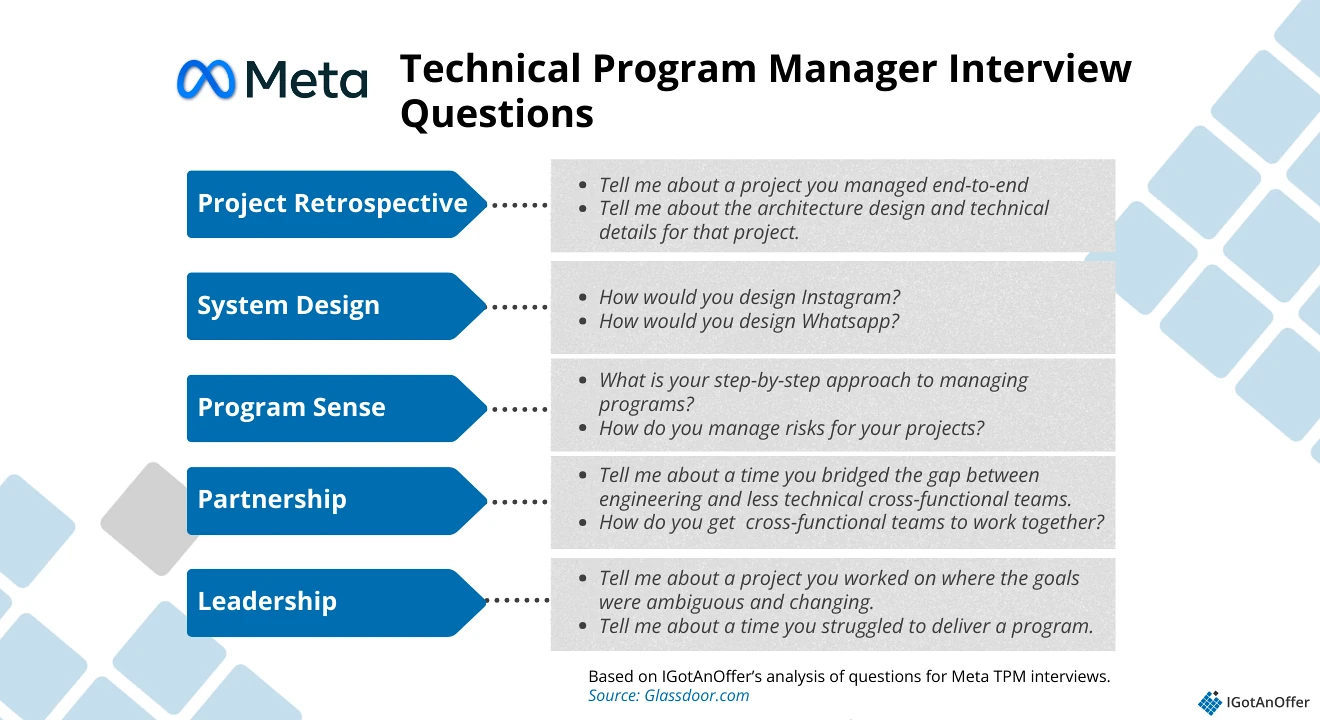
Let's dive in and look at the five types of interviews you can expect at Meta:
- Technical project retrospective
- Architecture and system design
- Program sense
- Partnership
- Leadership
We've analyzed questions reported by former Meta TPM candidates on Glassdoor.com and identified the ones that were most frequently asked for each interview type. You'll find a summarized list of these questions below for each interview type (*though we have changed the phrasing or spelling in some cases to make the questions easier to understand).
2.1 Technical project retrospective
MetaTPMs tend to work on very technical programs. The technical project retrospective therefore aims at testing your technical depth.
This is the part of the interview process where you need to show that you have thorough technical knowledge of the past programs you have worked on. You should be ready to cover the following topics for the programs you choose to talk about: technologies and architecture used, technical dependencies and tradeoffs, resource planning, risk mitigation, etc.
We've listed a typical sequence of the questions you can expect in this interview below.
Meta TPM interview questions - Technical project retrospective
- Tell me about a project you managed end-to-end
- Tell me about the architecture design and technical details for that project
- Tell me about how you managed technical dependencies and tradeoffs for that project
- Tell me about how you managed technical risks for that project
- Tell me about how you managed resource planning for that project
For more guidance on this type of interview, check out our guide to Meta project retrospectives.
2.2 Architecture and system design
Facebook, Instagram and WhatsApp all have 1bn+ monthly active users. Meta TPMs therefore need to design systems that are highly scalable. The system design questions you'll be asked are typically open-ended and will feel like a discussion if things go well.
This is the part of the interview where you want to show that you can both be creative and structured at the same time. You should be ready to gather requirements, design a system at a high level, and then deep dive into relevant components with your interviewer.
Here are some common system design questions asked in the Meta TPM interview reports which can be found on Glassdoor.
Meta TPM interview questions - System design
- How would you design Instagram
- How would you design WhatsApp?
- How would you design Facebook Live
- How would you design a travel booking system for Facebook users
- How would you design a transfer system for large files
- How would you design an online collaborative editor (e.g. Google Docs)
- How would you design a typehead feature (e.g. Google search autocomplete)
- How would you design Twitter's trending topics
- How would you design a distributed Botnet
- How would you design a system that can handle millions of card transactions per hour
For a closer look at the system design/product architecture part of your interview, see our specific guides: Meta system design interview (questions, process, prep) and Meta product architecture interview.
2.3 Program sense
Meta TPMs design and execute programs from end-to-end. It's therefore important that they have a strong ability to plan, work with others, and unblock situations when needed.
This is the part of the interview process where you need to show you think about programs in a comprehensive way (e.g. resources, risks, KPIs, etc.) and have a track record of executing flawlessly.
We've listed a typical list of questions you can expect in this interview below. Notice you should be ready to answer hypothetical questions (e.g. How would you do XYZ), and behavioral questions (e.g. Tell me about a time you did XYZ).
Meta TPM interview questions - Program sense
- What is your step-by-step approach to managing programs?
- How do you make trade-offs between time, resources, scope and risks?
- How do you define roadmap milestones and execute your projects?
- How do you manage risks for your projects?
- How do you define KPIs for your projects?
- How do you manage cross-team dependencies and deliverables?
- How would you handle performance decline in a program?
- How do you sunset a program?
- Tell me about the most difficult situation you've been in as a TPM
- Tell me about a time you were late on an early milestone
- Tell me about a time you changed a process to make it better
- Tell me about a time you were on an extremely tight deadline
2.4 Partnership
Meta TPMs usually work in cross-functional teams with other engineers, product managers, PMMs, designers, data analysts, etc. They need to communicate clearly, work with others efficiently, build trust and relationships, etc.
This is the part of the interview process where you really want to show that you are good at working with others and driving successful cross-functional collaboration. Be prepared to talk about situations where you've troubleshooted project bottlenecks, negotiated design components with engineers, adapted your program when requirements changed, etc.
We've listed a typical list of questions you can expect in this interview below. Again, here, you should be ready to answer both hypothetical questions (e.g. How would you do XYZ), and behavioral questions (e.g., Tell me about a time you did XYZ).
Meta TPM interview questions - Partnership
- Tell me about a time you bridged the gap between engineering and less technical cross-functional teams
- Tell me about a time you got buy-in from peers who were initially resistant to your idea
- Tell me about the most difficult challenge you had working in a cross-functional team
- Tell me about a time a resource from another team did not want to work on your project
- Tell me about how you kept stakeholders up to date for a given project
- How do you get resources from other teams to work on your projects?
- How do you get multiple cross-functional teams to work together?
2.5 Leadership / Team collaboration
Meta TPMs lead programs and usually don't have direct authority over most of the resources they work with. They therefore need to lead teams by influencing and motivating others, resolving conflicts when they arise, driving alignment across their team, etc.
This interview will feel similar to the Partnership interview but will focus on pure leadership rather than your ability to work in a cross-functional environment.
We've listed a typical list of questions you can expect in this interview below. In addition, we've also included typical behavioral questions (e.g. "Tell me about yourself", "Why do you want to work at Meta?", etc.) that you might get asked in any Meta interview.
Meta TPM interview questions - Leadership
- Tell me about yourself
- Why work at Meta?
- Tell me about a time you resolved a conflict at work
- Tell me about a time you disagreed with your team / manager and how you handled the situation
- Tell me about a time you received difficult feedback from a manager
- Tell me about a project you worked on where goals were ambiguous and changing
- Tell me about a time you struggled to work with one of your colleagues
- Tell me about a time you struggled to deliver a program
3. How to prepare for Meta TPM interviews
Now that you know what questions to expect, let's focus on how to prepare. Here are the four most important things you can do to get an offer as a Meta technical program manager.
3.1 Learn about Meta's culture
Most candidates fail to do this. But before investing tens of hours preparing for an interview at Meta, you should take some time to make sure it's actually the right company for you.
Meta is prestigious and it's therefore tempting to ignore that step completely. But in our experience, the prestige in itself won't make you happy day-to-day. It's the type of work and the people you work with that will.
If you know TPMs, engineers or PMs who work at Meta or used to work there it's a good idea to talk to them to understand what the culture is like.
In addition, we would recommend reading up about Meta in the media or on its own publications. Here are some to get you started:
- Meta's 6 core values (by Meta)
- Meta interview fact sheet (by IGotAnOffer)
- Facebook’s “hacker culture” (by Mark Zuckerberg, via Wired)
- Meta annual reports and strategy presentations (by Meta)
- Meta's approach to tech trends (by CB Insights)
- Meta org culture analysis (by Panmore Institute)
3.2 Learn by yourself
As mentioned above, you'll have five types of interviews at Meta: technical project retrospective, system design, program sense, partnership and leadership.
For the technical project retrospective, we recommend selecting one or two projects and writing answers for the different questions we have listed in the previous section. Remember that the main purpose of the interview is to test your technical depth. So, make sure you are comfortable with all the technical details regarding the programs you decide to talk about.
For system design interviews, we recommend studying our article on system design interview questions. The guide covers a step-by-step method for answering system design questions, and provides several example questions with solutions.
For program sense interviews, we recommend diving into our program management primer, as well as how Meta does program management. A good starting point is the following two blog posts by Nick Corral and Anand Parikh who are both senior TPMs at Meta. You might also find the following Meta TPM video helpful. In addition, you'll want to write down answers for the program sense questions we've listed in the previous section.
For partnership and leadership interviews, we recommend reading our leadership and people management primers, as well as learning our step-by-step method to answer behavioral questions. You can then use that method to craft answers for the main questions we have listed above.
We also have an article on what a real Meta interview experience is like, with success stories from people we've worked with. Check that out to get some prep best practices from successful candidates.
Once you’re in command of the subject matter, you’ll want to practice answering questions. But by yourself, you can’t simulate thinking on your feet or the pressure of performing in front of a stranger. Plus, there are no unexpected follow-up questions and no feedback.
That’s why many candidates try to practice with friends or peers.
Are you also preparing for TPM interviews at other FAANG companies? You may find our Google TPM interview guide and Amazon TPM interview guide helpful as well.
3.3 Practice with peers
If you have friends or peers who can do mock interviews with you, that's an option worth trying. It’s free, but be warned, you may come up against the following problems:
- It’s hard to know if the feedback you get is accurate
- They’re unlikely to have insider knowledge of interviews at your target company
- On peer platforms, people often waste your time by not showing up
For those reasons, many candidates skip peer mock interviews and go straight to mock interviews with an expert.
3.4 Practice with experienced Meta interviewers
In our experience, practicing real interviews with experts who can give you company-specific feedback makes a huge difference.
Find a Meta TPM interview coach so you can:
- Test yourself under real interview conditions
- Get accurate feedback from a real expert
- Build your confidence
- Get company-specific insights
- Learn how to tell the right stories, better.
- Save time by focusing your preparation
Landing a job at a big tech company often results in a $50,000 per year or more increase in total compensation. In our experience, three or four coaching sessions worth ~$500 will make a significant difference in your ability to land the job. That’s an ROI of 100x!







